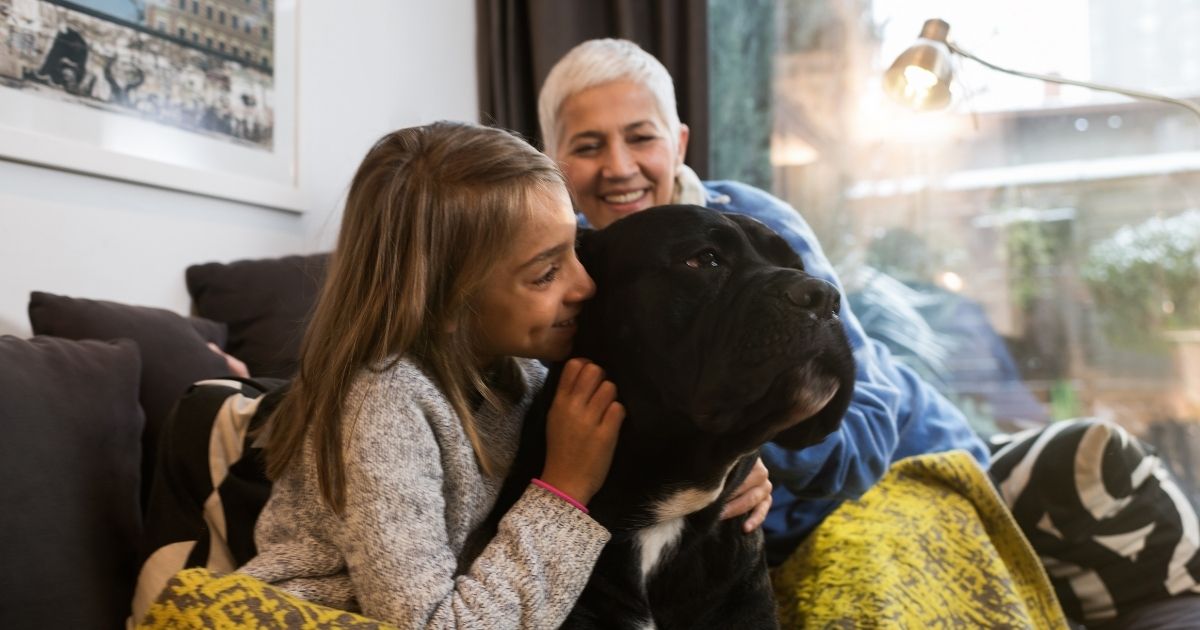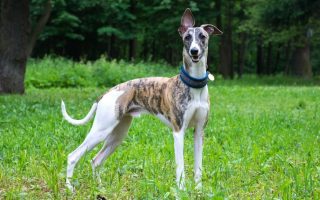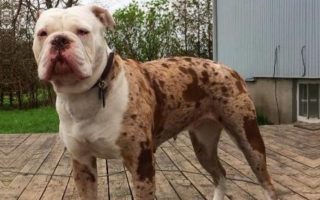The Cane Corso dates back to the Roman Molosser.
Originally, medievals had them to guard livestock and protect property, hence, the term ‘Cane de Corso’, which is Latin for “guardian”.
Chances are you’ll find them in these capacities up till today. But are Cane Corsos good family dogs? Read on to find out.
They have had a pretty rough history.
Given that they were mostly bred in Italy, the onset of the industrial revolution coupled with warfare and natural disasters decreased their numbers and relevance.
Save for the efforts of Providence, they would have gone extinct for good.
You would find the Cane Corso as an intelligent yet powerful dog. At other times though, they tend to come off as headstrong and stubborn.
In 2010, they were officially recognized by the American Kennel Club as a dog breed, by the Italian Kennel Club in 1994, and by the World Canine Organization in 2007. [1][2]
Cane Corso Dog Breed Information
| Height | Male: 24 to 28 inches Female: 23 to 26 inches |
| Weight | Male: 99 to 110 pounds Female: 88 to 99 pounds |
| Lifespan | 10 to 12 years |
| Coat | Stiff, Coarse Coat with a light Undercoat |
| Colors | Red, Black, Gray, Fawn, Brindle |
| Temperament | Intelligent, Loyal, Calm, Trainable, Even Tempered |
| Ideal For | Experienced Owners |
| Hypoallergenic | No |
| Origin | Italy |
| Breed Recognition | The American Kennel Club (AKC), The Italian Kennel Club (IKC), The United Kennel Club (UKC), Cane Corso Association Of America (CCAA) |
| Puppy Price | $1000 – $4000 |
Cane Corso Characteristics
| Health | High |
| Grooming | High |
| Friendliness | Medium |
| Energy | High |
| Trainability | Medium |
The Typical Cane Corso Temperament
In their description, the Cane Corso Association of America (CCAA) says they are “unique, intensely loyal, protective, sensitive and serious.” [3]
No description could be more fitting.
It almost seems that ingrained in their DNA is an irredeemable fierce trait to always look out for their owners.
Granted, most dogs tend to be protective but the Corso take theirs to a whole new level.
If you would have a Corso, it’s dead necessary you are very firm in their training.
They, naturally, are dominant in nature and tend to come off as the alphas of any group they are in.
The CCAA recommends that a Corso be taken in young and that their training starts immediately.
Only then can you guarantee that they won’t boss you over but actually care and look out for you.
Corso dogs are inherently destructive. If neglected for long, the trait manifests.
It’s not uncommon for owners to get back and find their shoes, furniture and rugs chewed and disfigured.
If you would leave them alone for any significant time period, best you provide them with several tasks that will take them off boredom.
Are Cane Corsos Good Family Dogs?
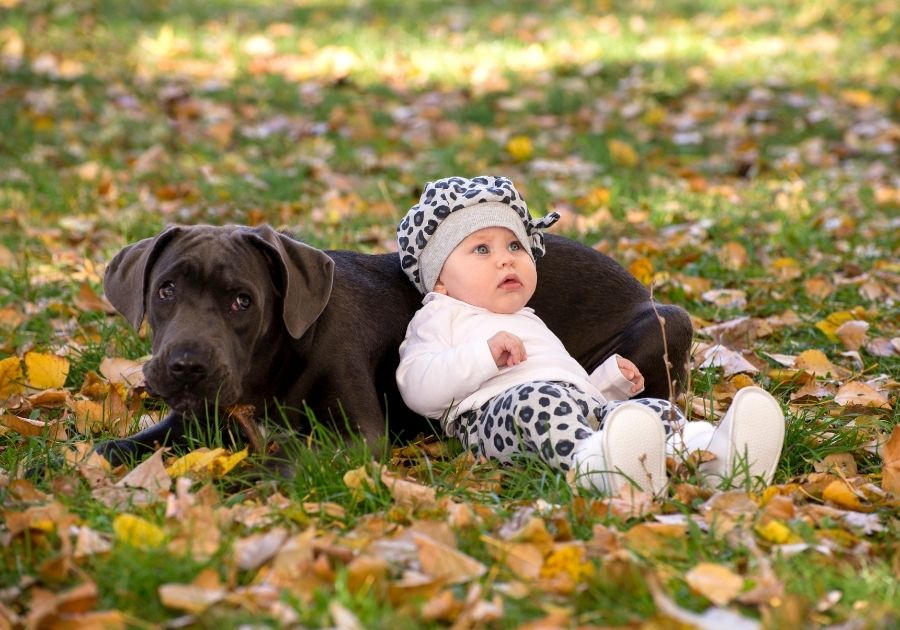
If you take into account the totality of their temperament, you would eventually conclude that the Cane Corso is a great fit for any family.
Points in their favor: they are affectionate, very protective, and totally beloved by kids.
Due to their size and lively personality, it’s important that you supervise their interaction with little children to minimize risks of unintentional injury.
Some parents go as far as having the Corso babysit their kids.
We urge that you take some time to teach your kids how to interact with such a large breed as the Cane Corso.
Familiarize them with basic commands like “no” and “sit” to grant them greater dominance during interactions.
Have your kids realize that tugging at the Corso’s tail is a no-no and teach them to never wrestle or attack the dog.
Your Corso would turn the earth upside down to protect your kids if necessary.
This doesn’t guarantee that he would extend the gesture to other children.
Take a gradual approach to familiarize him with kids he’s not used to yet.
Are Cane Corso Good with Other Dogs and Pets?
Back in medieval Rome, Cane Corso tagged alongside hunters on hunting exploits.
Probably explains their high prey drive. Introducing Cane Corso into a cross-pet household might not bode too nicely.
Most owners report that Corso regards cats as prey and would likely chase your kitty every time they are in proximity.
You could end up with expensive medical costs if your cat ever got bitten by a Corso.
With most dogs though, they tend to get along.
However, there is a tendency for them to be aggressive toward small-sized breeds or opposite-sex dogs.
Socialization is the key to getting them comfortable with cats, other dogs, and livestock.
Consider taking them on vacays with other dogs.
Remember to keep them on a lead or totally muzzle them until both dogs are comfortable in each other’s company.
Are Cane Corso Friendly?
Getting your dog to be more friendly with people would necessitate that you walk him regularly around the neighborhood and get him familiar with as many new people as possible.
To forestall possible attack scenarios, it’s essential you muzzle and keep him on a leash when in public.
Obedience classes would come in handy too. Try to enroll him in one.
Are Cane Corso Easy to Train?
Corso are easier to train when younger. The key tip to remember is that you are the alpha.
Remain confident and stick to your training regimen, and your pet would have no choice but to respond to your proddings.
Corso are headstrong and would push you to see how far they can get away with.
As such, you shouldn’t be surprised if you ever observe unruly behavior from your K9.
Cane Corso Grooming Requirements
While their coats may be short, it applies that they are not a single-coated breed.
They have an undercoat and they tend to shed periodically through the year.
Worthy of note is the fact that their coat length depends on the climatic conditions prevalent in their vicinity.
Warmer climates tend to cause Corso to have lesser coat thickness compared to those living in colder climates.
Coat
Especially during spring, once a week brushing and currying are recommended, to reduce the amount of dead hair on their coats.
You could use a mitt or a bristle brush. Afterward, consider applying coat polish to brighten the sheen.
Nails
You should keep their nails short. Cut your dog’s nails every 2 to 3 weeks or so. A nail clipper would come in very handy.
When clipping though, remember to cut away only the nail’s outgrown tip.
Pups tend to be extra sensitive to the whole cutting process. As such, you shouldn’t start trimming all at once with them.
Familiarize him with the clipper and progress to squeezing his paws before you eventually start trimming.
Common Health Problems
Most licensed breeders keep to the established standards of dog clubs like the American Kennel Club. [4]
If you purchased a Corso pup from any of such breeders, you can rest assured they’ve been vetted by a veterinarian before being let go and are likely to have little to no underlying health issues.
Regardless, the breed has some residual health conditions inherent in their gene. It pays to look out for the following:
Hip Dysplasia
Hip dysplasia results in a loosened hip joint in dogs. This causes locomotive dysfunction and joint aches. [5]
Mostly large dogs, of which the Cane Corso lends itself readily to, are affected.
If not properly managed, it can lead to arthritis and lameness.
Gastric Dilatation-volvulus
Bloating after eating and drinking too fast is possible. If the stomach twists, it can cut off the blood supply and create a medical emergency.
Ectropion
Your pooch runs a tendency to develop ectropion as he has loose skin. Ectropion causes a dog’s lower eyelid to roll out or droop.
The condition is usually accompanied by inflammation and redness of the conjunctiva.
You should meet with a vet for eye drops as they help with the inflammation.
Cane Corso Care: Is the Cane Corso Right For You?
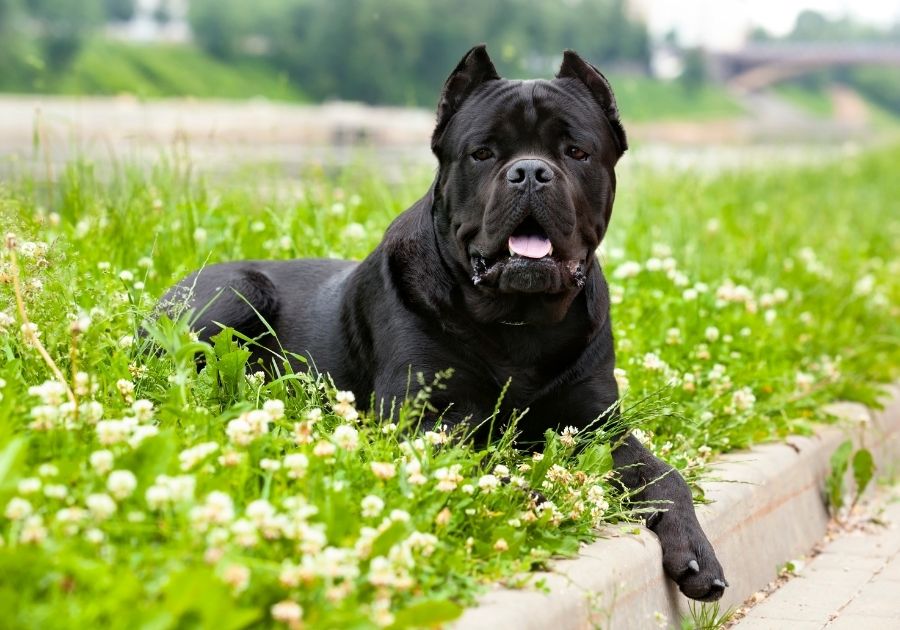
Your pooch needs a great deal of physical exercise to stay fit. Take him regularly on a planned walk every other day.
You should also consider getting yourself a bicycle and an attachment to allow him to keep along while you ride.
Go gentle on little pups though. For the first one and a half years or so, they tend to be frail.
We need not tell you that you shouldn’t subject them to as much stress as you give a full-grown adult.
Consider staving him off boredom with tasks and activities that keep him engaged.
Such could be leading livestock, competing with other dogs in a sport, practicing new tricks, etc. An hour a day is adequate for these engagements.
You could consider breaking it up into shorter intervals with breaks in-between.
Off-leash and/or unmuzzled Corso can be dangerous if aggressive.
If you would keep them around, ensure they are properly fenced-in and would not be able to leave your property without your blessing.
With such a large breed like the Corso, you should expect high costs and expenses to tag along.
His vet bills would be higher than a smaller breed and so would his feeding bills.
If you insist on having a Corso, factor all these in as you would have to keep up for about 10 to 12 years.
What is the average price for a Cane Corso puppy?
Most breeders peg a Cane Corso puppy’s purchase price between $1,000 to $4,000. Older puppies tend to cost less.
Some renowned breeders could charge as high as $10,000 for a single pup.
Their reputation for breeding superior pups alongside the possibility of demand being inadequate for supply could force the price tag that high.
Remember, you can always adopt an older Cane Corso from a foster home.
Apart from giving another dog a shot at life, you likewise would be giving a home to a dog in need.
Are Cane Corso aggressive?
Cane Corso was originally bred to protect and guard humans and livestock. Inherent to them is a possessive, assertive personality.
These qualities make them aggressive toward unfamiliar entities encroaching on their territories.
To make them friendlier and more sociable, all you need do is socialize them from their early days according to the steps explained prior.
Is Cane Corso good for first-time owners?
If you’ve not owned any other dogs prior or you’ve owned only ‘soft’ small-sized breeds, we urge you to pass on the Cane Corso.
They are headstrong and dominant in nature, if you are not firm in handling them, they could be way too much for you to handle.
Do Cane Corso bark a lot?
Compared with most other breeds, the Cane Corso do not bark all that much.
At times though, they tend to fall into the habits of incessant and prolonged howling.
Their inherent protective personality coupled with, if applicable, a lack of earlier socialization all pretty much influence how much they bark and who they bark at.
To minimize the possibilities of distrust toward strangers, it is essential you do not overlook their early socialization.
Do Cane Corso drool?
All Corso drool but the extent to which they drool depends on how loose their jowls are.
Corso with more floppy jowls drools a lot compared with those with shorter jowls.
It gets more profound particularly when they just drunk or when they expect to be served food.
It helps to know that excited Corso or happy ones or Corso anticipating food tend to drool more than usual.
If you observe that your Corso’s level of salivation is out of the ordinary, there is a possibility it might be due to:
- Dental Problem: A shaky tooth or excessive growth of plaque and tartar.
- Poison: Foamier and frothier drool than normal is a pointer that your pet might have eaten a poisonous substance.
- Excessive Heat: Dogs drool to cool themselves down. So, an out-of-the-ordinary amount of drool might be an indication that your dog is hotter than normal
- Buccal Growths: At times, excessive drool might be due to growths of lumps – harmless and cancerous in the dog’s mouth.
Final Thoughts
Hardly would you find many dogs with as detailed a historical background as the Cane Corso.
From being key to primordial warfare to getting drafted into guarding livestock and eventually helping out on farms, they’ve come a long way even surviving extinction to becoming the kids-favorite, powerful dogs they are today.
The key to making them the ideal pet is to properly socialize them and be firm with their training.
If it’s your first time owning a dog, we urge that you pass on the Corso.
They are best suited for experienced dog owners used to teaching dogs obedience rules from a young age.
If you slack in handling him, his inherent dominant personality will eventually kick in and would see him come off as the alpha in your home.
While the Cane Corso is a great family dog, it may not be for everyone.
But with proper training and care, they will eventually turn out as a best friend.
You May Like:
Most Dangerous Dog Breeds You Mustn’t Mess With

